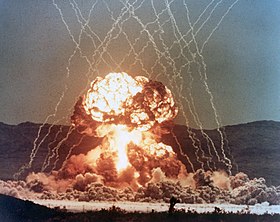Operation Cue
| Operation Teapot | |
|---|---|

Teapot MET (Military Effects Test)
|
|
| Information | |
| Country | United States |
| Test site |
|
| Period | 1955 |
| Number of tests | 14 |
| Test type | cratering, free air drop, parachuted, tower |
| Max. yield | 43 kilotonnes of TNT (180 TJ) |
| Test series chronology | |
|
|
|
Operation Teapot was a series of fourteen nuclear test explosions conducted at the Nevada Test Site in the first half of 1955. It was preceded by Operation Castle, and followed by Operation Wigwam. Wigwam was, administratively, a part of Teapot, but it is usually treated as a class of its own. The aims of the operation were to establish military tactics for ground forces on a nuclear battlefield and to improve the nuclear weapons used for strategic delivery.
The United States test series summary table is here: United States' nuclear testing series.
Table notes:
During shot Wasp, ground forces took part in Exercise Desert Rock VI which included an armored task force Razor moving to within 900 metres (3,000 ft) of ground zero, under the still-forming mushroom cloud.
An augmented test unit from the United States Marine Corps participated in shot Bee during the March 1955 exercises.
The MET was the first bomb core to include uranium-233 (a rarely used fissile isotope that is the product of thorium-232 neutron absorption), along with plutonium; this was based on the plutonium/U-235 pit from the TX-7E, a prototype Mark 7 nuclear bomb design used in the 1951 Operation Buster-Jangle Easy test. It produced a yield of 22kt (comparable to the Fat Man plutonium-only weapon that exploded over Nagasaki), but significantly less than the expected amount. Since it was a military effects test, the DoD specified that the device should have a calibrated yield within 10% of ratings. However, weapon designers at Los Alamos substituted the experimental core without notifying the DoD. The unexpected lower yield, 33% less than the DoD expected, ruined many of the military's tests.
...
Wikipedia
